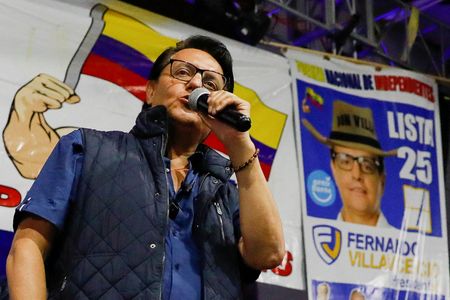 1
1 1
1
By Alexandra Valencia
QUITO (Reuters) -The murder of Ecuadorean presidential hopeful Fernando Villavicencio has led to a frenzy of speculation from politicians across the spectrum, including from allies who were with him in the moments before he died, about why he was killed and why he was not better protected.
Villavicencio, who was gunned down in Quito last week, built a name for himself as an investigative journalist rooting out graft before he became a lawmaker. He was no stranger to threats.
Police have arrested six suspects who they say are all Colombians belonging to criminal groups; another was killed in the shoot-out.
But there are still no clear answers as to the motive for his murder, who was really behind it, or why his security failed. In that vacuum, speculation is rife.
Police have said that Villavicencio, who was shot in the head as he entered the backseat of a car following a campaign event at a sports center, had three rings of security.
Three police officers were among the nine people injured in the shooting. Police also safely detonated an explosive at the site.
“He should have had a much stronger (security) structure,” Patricio Carrillo, a former interior minister and legislative candidate who was with Villavicencio at the event where he was murdered, told Reuters.
“People loved him and every time there was more emotion and no way to avoid people hugging him,” said Carrillo. “That day a lot of people were around his immediate security and wanted to get photos, to be next to him.”
After the event, Villavicencio exited out the front of the sports center, where many people had gathered, Carrillo said, adding that he himself had stayed inside chatting to some friends. Carrillo and his friends were evacuated by two security staff out the back door when they heard the shooting.
“We thought we were covered, but that coverage wasn’t enough,” Carrillo said. “For that the police must respond… They talk about the three rings of security but they aren’t talking about the negligence.”
In response to a request from Reuters, the police sent a statement posted online which says that they are conducting an internal investigation and working with the attorney general’s office to find those responsible for the killing.
Police said last week their investigation includes questions about why an armored vehicle normally used by the candidate was in Guayaquil and not with Villavicencio on the day of the murder.
Villavicencio’s family on Friday said they blamed the Ecuadorean state and President Guillermo Lasso, along with authorities responsible for security, for failing to provide adequate protection.
“We are denouncing the Ecuadorean state for the crime of murder … there was an intentional omission, the state did not fulfill its role as guarantor,” said Marco Yaulema, a Villavicencio family lawyer.
Lasso’s press office said in a statement it rejected the family accusation and asked the case not be “politicized.”
“(The government asks) the justice system be allowed to move forward with the investigations and reach a procedural truth,” the statement said.
Ecuador’s interior minister Juan Zapata told reporters that the government will have the results of the internal police investigation in the coming days.
THEORIES
Carrillo, echoing calls by Villavicencio’s widow last week, said the most important thing was “to find the person who financed this killing, the intellectual author.”
Christian Zurita, Villavicencio’s replacement candidate for the Construye party, was also at the sports center on the day of the murder. He told journalists on Thursday he believed, without producing evidence, that Villavicencio had been killed because he wanted to militarize the country’s ports, key exit points for drugs being smuggled abroad.
The murder has cast a shadow over Sunday’s election to choose a replacement for Lasso. The front-runner is Luisa Gonzalez, a protege of former President Rafael Correa.
Correa, who in office regularly clashed with Villavicencio, has called the killing a false flag operation to hurt his Citizen’s Revolution party.
“I have no doubt that this is a plot, a conspiracy to prejudice the Citizen’s Revolution,” said Correa, appearing virtually at a campaign rally for Gonzalez on Wednesday.
Without providing any evidence, he has accused the police of being complicit, said Villavicencio’s armored car was parked at the back entrance of the sports center and that the car which Villavicencio was entering had no driver, and said Villavicencio’s cellphone had gone missing.
“It’s clear this benefits the fascist right, those who want the current situation to continue, those who don’t want the Citizen’s Revolution to return,” he said.
(Reporting by Alexandra Valencia; Writing by Julia Symmes Cobb; Editing by Rosalba O’Brien)